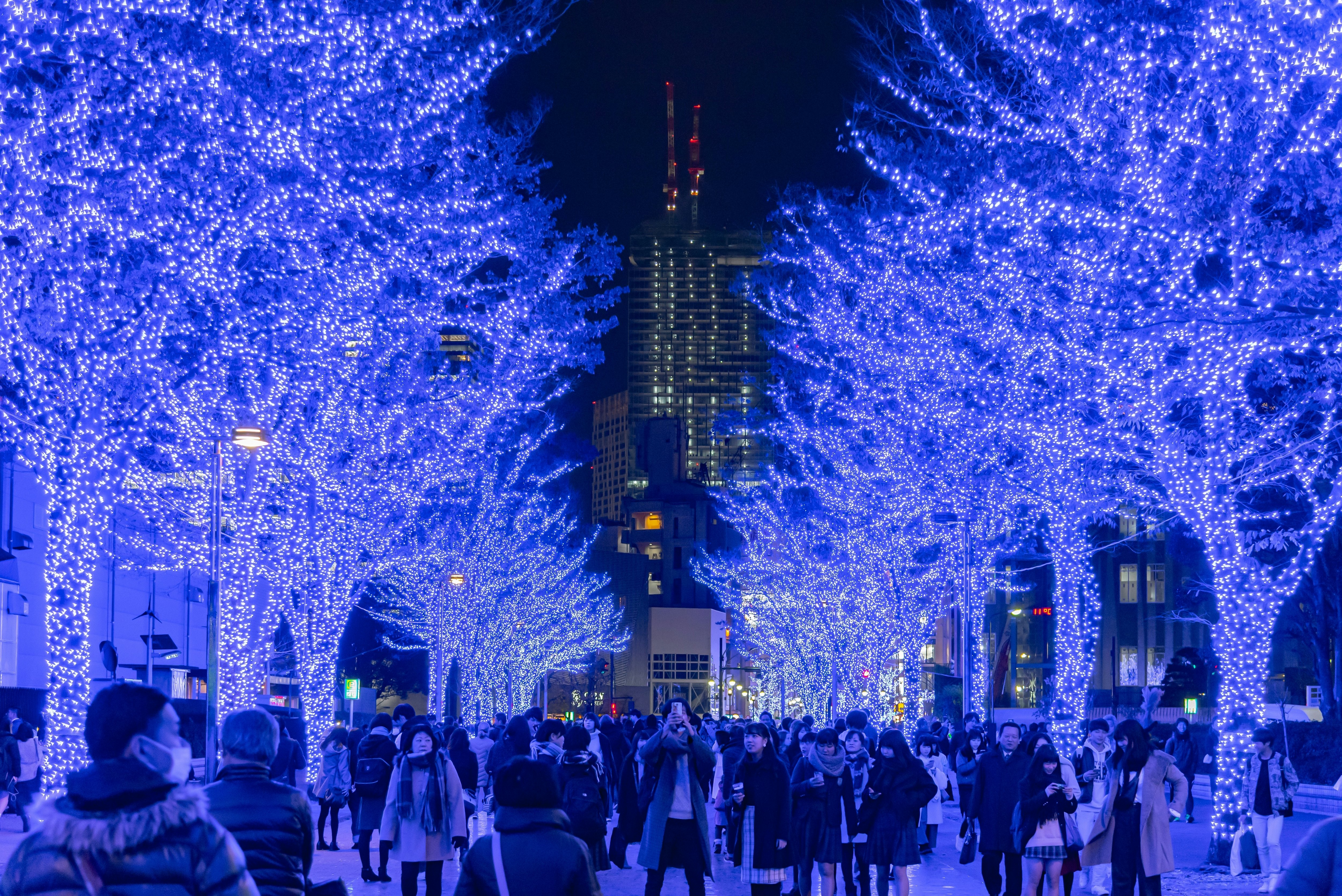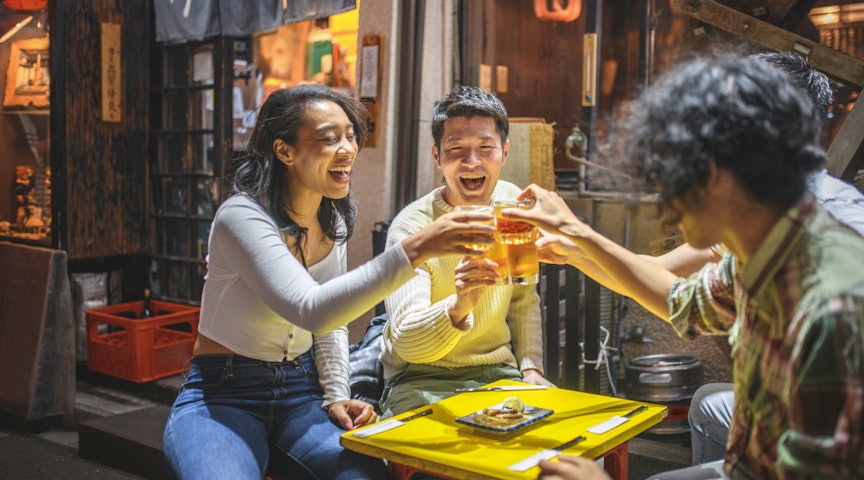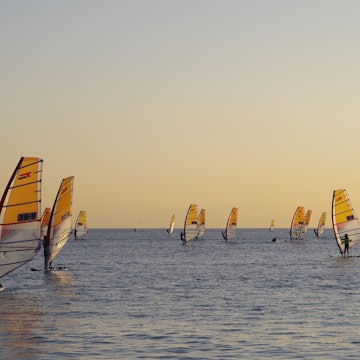
The 18 best free things to do in Tokyo



From iconic urban landmarks to sumo wrestling, there's plenty to see for free in Tokyo. Rintaro Kanemoto for Lonely Planet
Exploring Japan's capital is a mind-blowing experience, but it can also blow your budget.
Don't despair – there’s an abundance of things to do and see in Tokyo that don’t cost a single yen. From gardens and temples to contemporary art, sumo practice and a world-famous fish market, we put together a list of the best free activities in Tokyo.
If you are wondering when to visit, here are our tips on when to visit Tokyo.
1. Explore the Imperial Palace gardens and grounds
Follow the moats and paths surrounding Tokyo’s central point, the Imperial Palace, for views of its famous bridges and remnants of the old medieval keep. It’s 5km (3 miles) around the palace grounds – a popular local jogging course if you want to fit in some cardio while admiring the scenery.
Take a detour through the accompanying gardens without dipping into your wallet. The Imperial Palace East Garden encompasses the Honmaru and Ninomaru, the former innermost circles of the castle, featuring broad lawns, small stretches of woodland and seasonal flora (check out what’s in bloom on the Flower Calendar).
Kokyo Gaien National Garden marks the area in front of the palace’s Sakuradamon Gate, where Ii Naosuke, a controversial proponent of opening Edo-period Japan to the outside world, was assassinated in 1860.
Kitanomaru Park is the pick of the bunch, home of the Budokan, Japan’s premier martial arts arena, and the Chidorigafuchi Moat. In spring, the path encircling the moat is enlivened by blooming cherry blossoms.

2. Visit Sensō-ji, Tokyo's iconic Buddhist temple
Follow in the footsteps of countless pilgrims by approaching Sensō-ji, Tokyo’s most famous Buddhist temple, in Asakusa.
The way is lined with colorful stalls selling all manner of souvenirs, from giant rice crackers to washi (handmade paper) fans. Senso-ji is Tokyo’s most-visited religious monument, so prepare for swarms of photo-snapping tourists and a smattering of locals decked out in traditional kimono.
Planning tip: Visit at the crack of dawn – the temple is open from 6am – for a quieter excursion.

3. Discover the vibrant streets of Harajuku
The Harajuku neighborhood is probably the world's greatest eye candy; its main street, Takeshita Dori, bursts forth in a maelstrom of vivid colors, kawaii (cute) motifs and the constant babble of frivolous consumers.
Stroll tree-lined Omote-sandō, a glam boulevard of upscale boutiques housed in contemporary buildings, or hang out in Yoyogi-kōen (Yoyogi Park). The sprawling green space hosts frequent international festivals celebrating cultures from Ireland to India, Spain to Thailand, Brazil to Sri Lanka, and many more.
4. See the tuna auction at Toyosu Market
Want to witness Tokyo’s famous tuna auction at Toyosu Market? A limited number of visitors who apply in advance can watch the hour-long quick-fire bidding from a viewing platform near the market floor; check the website for details.
Although Toyosu Market may lack the rustic charm of its predecessor in Tsukiji, visitors are nevertheless welcome to wander the sprawling complex. Infographics and exhibition spaces detail the storied history of the world’s greatest fish market; scan the clearly indicated QR codes for multilingual interactive tours.
Planning tip: If you've secured tickets for the tuna auction, you'll need to set your alarm early, because it starts around 5:30am.

5. Watch sumo wrestlers training
Even if you can't make a sumo tournament, you can see sumo wrestlers going through their training drills at a sumo stable, such as Arashio Stable, where visitors can watch the morning practice session (asa-keiko) through windows on the street.
Practice typically takes place between 7:30am and 10am on weekday mornings, except in March, July, November and on the week following a major tournament. Check the stable’s website for the up-to-date training schedule.
6. Follow the crowd at Shibuya Crossing
Every few minutes a wave of humanity washes across Shibuya Crossing, thought to be the world's busiest intersection. Join the masses or stand back and watch.
An ideal vantage point is Mag's Park, on the roof of the Shibuya 109-2 department store. A couple of floors down, at the entrance to Mark City, check out the Myth of Tomorrow, a monumental 1967 mural by artist Okamoto Tarō.

7. Hear Godzilla roar
Fans of kaijū (strange beasts from Japanese monster flicks) will want to pay their respects to the giant Godzilla that lords over the Hotel Gracery Shinjuku. Amateur videographers should head down between noon and 8pm when Godzilla belts out thunderous roars on the hour.
Planning tip: While you’re here, wander around the electrified Kabukicho neighborhood, Tokyo's red-light district, or head to nearby Golden Gai, a warren of Showa-period alleyways housing hundreds of shoebox bars.
8. Visit Tokyo's weird, wonderful (and free) museums
Tokyo has some of the most bizarre museums in the world, and in a bid to attract curious eyes, many offer free admission, making them one of the best budget-friendly things to do in Tokyo. The Meguro Parasitology Museum, thought to be the only institution of its kind globally, displays a range of sinister parasites suspended in formaldehyde-filled casings.
The Rainbow Sewerage Museum delves into the engineering feats necessary to flush excrement from the world’s most populous metropolis – interactive exhibitions included.
For coin collectors and enthusiasts, head to the Bank of Japan Currency Museum, which is (ironically) also free. Or check out the Advertising Museum Tokyo, where montage displays of old ads illuminate the visual history of commerce in Japan over the last century or so.

9. Walk the forests of Meiji-jingū
Escape to the densely wooded grounds that envelop the capital’s premier Shintō shrine, Meiji-jingū. The walking path is particularly ethereal on misty and drizzly afternoons and, if you’re lucky, you might spot a traditional wedding procession or robe-clad priest.
10. Walk the Rainbow Bridge to Odaiba
This island of reclaimed land in Tokyo Bay is linked to the city by the Rainbow Bridge, which is illuminated in its eponymous colors come nightfall.
Walk over the 798m-long (2618ft) single-span suspension bridge to Odaiba, an uber-modern commercial district, where you can sunbathe on an artificial beach (weather permitting), see a Statue of Liberty replica, and gaze upon a larger-than-life Gundam statue.
11. Take a tour of the National Diet
Art and anime not your thing? Then how about a free tour of Japan’s seat of governance, the National Diet, to view the wood-panelled, leather-bound and gilded interiors and the gardens planted with species from across the country.
English tours take place on Mondays at 2pm, and Tuesday to Friday at 3pm (excluding national holidays). Reservations, with some stipulations, are necessary.

12. Crack open a beer at one of Tokyo's parks and gardens
Admire beautiful foliage and horticultural skills in the traditional gardens, undoubtedly one of the best free sights in Tokyo. Free-to-enter gardens include those attached to the Hotel New Ōtani in Akasaka and the Hotel Chinzanso, as well as the lush grounds of Happō-en, near Shirokanedai Station.
Tokyo also has excellent public parks, from Ueno-kōen in the north, to Inokashira-kōen in Kichijōji (where the not free-to-enter Studio Ghibli Museum is also located).
Planning tip: Parks are prime spots for joining beer-fueled hanami (flower-watching) parties during the spring cherry blossom season.
13. Travel back to pre-WWII Tokyo in Yanesen
The streets of Yanaka, Nezu and Sendagi – three areas collectively known as Yanesen – offer a lens into pre-WWII Tokyo.
These areas were collectively spared by firebombings, so you'll find narrow walking streets, small temples and shrines, craft shops, galleries, and cafes, and Yanaka-reien, one of the city’s oldest graveyards. Interesting galleries include SCAI the Bathhouse, in a 200-year-old public bath.

14. Traverse Tokyo’s winter wonderlands
Tokyo embraces the festive spirit every winter with seasonal illuminations in parks and commercial complexes, many of which are free of charge.
Around 600,000 crystal blue lights create Shibuya's Ao no Dokutsu (blue cave) along a pedestrianised street leading to Yoyogi Park, while the barren zelkova trees lining fashion-focused boulevard Omote-sandō are wrapped in champagne gold.
Admire a glimmering LED display in view of Tokyo Tower from the observation bridge at Roppongi Hills. Or head to the Yebisu Garden Place Christmas Market presided over by a 10m-tall Christmas tree and Baccarat crystal chandelier.
15. Get artsy in Roppongi
This fabled nightlife neighborhood is also a treat to explore in daylight. There’s plenty of public art scattered around the glitzy commercial complexes of Roppongi Hills and Tokyo Midtown, as well as dazzling contemporary architecture at the National Art Center Tokyo.
Tokyo Tower – the Eiffel-esque symbol of the modern metropolis – is nearby; there’s an admission charge, but a free stroll around the base gives a real sense of its imposing stature.
16. Take in the views from the Tokyo Metropolitan Government Building
Survey the city 202m (663ft) above ground from the observation deck of the Tokyo Metropolitan Government Building – on a clear day you may even catch a glimpse of Mt Fuji. Come at dusk to see spectacular sunsets and to witness the city bursting into neon-lit action.

17. Peruse the stalls and street food vendors at Tsukiji Market
Tsukiji Market has a bunch of stalls selling culinary products such as dried aonori (edible seaweed), pickles, bamboo rolling mats, kitchen knives, and more. Come early to get breakfast (at a price) from the food vendors and to bask in some old Tokyo ambience.
Planning tip: If the weather is on your side, embark upon a lengthy (approximately 6km/4-mile) stroll along the Sumida River promenade to Asakusa in the north, where Sensō-ji resides. Expect to find afternoon joggers, lone musicians practicing their craft, and river taxis chugging along the way.
18. Climb Mount Takao
Deep in the west Tokyo suburbs sits Mt Takao, a 599m-tall (1965ft) peak topped by an observation area, beer garden and Buddhist temple.
There are several walking trails to the top, all of which are manageable with a moderate level of fitness.
Planning tip: Head during kōyō (autumn foliage season) for the best views – but be prepared for crowds.
Take your Japan trip with Lonely Planet Journeys
Time to book that trip to Japan
Lonely Planet Journeys takes you there with fully customizable trips to top destinations–all crafted by our local experts.
























